CRISPIAN STEELE-PERKINS
in conversation with
Bruce Duffie
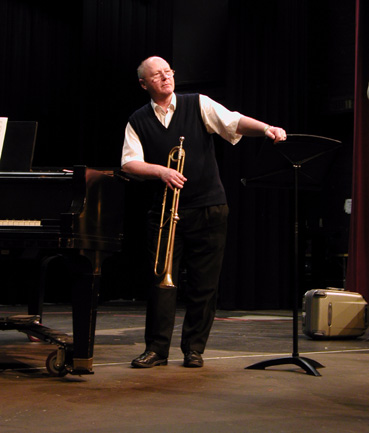 Trumpeter
extrodinaire on both old and new instruments, Crispian Steele-Perkins
has
built a foremost reputation around the world for his artistry and
intelligence.
Bringing music that is both historically accurate as well as generally
entertaining is his goal, and he manages to succeed very well no matter
what the venue or the situation.
Trumpeter
extrodinaire on both old and new instruments, Crispian Steele-Perkins
has
built a foremost reputation around the world for his artistry and
intelligence.
Bringing music that is both historically accurate as well as generally
entertaining is his goal, and he manages to succeed very well no matter
what the venue or the situation.
Going from place to place almost like a wandering minstrel of yore,
he brings the joy of discovery to those who have never really taken the
time to observe the instrument, as well as other performers who might
want
to spend their lives entirely in the world of brass playing.
It was on the first day of April in 2001 that Crispian
Steele-Perkins
returned to Chicago, specifically to Northwestern University for a
recital
and master classes. I had the privilege of meeting him in one of
the small performance rooms for a most plesant chat. Here is much
of what was said that afternoon . . . . .
Bruce Duffie: You were just saying that the trumpet
students
now are much better taught. Is that partly a tribute to you and
your
students, and your grand-students and your great-grand students?
Crispian Steele-Perkins: As a matter of fact, I haven’t
taught for ten years. Currently I have to do a lot of playing,
and
I’ve got so many different instruments that I’ve got to practice.
So right now, all the teaching that I do is teaching myself.
BD: But you did do some teaching earlier in your
career?
CSP: Yeah, I did. I taught at the Guildhall
School
of Music for ten or eleven years, and I still do a lot of master
classes
- including the one here at Northwestern earlier today. I really
enjoy that.
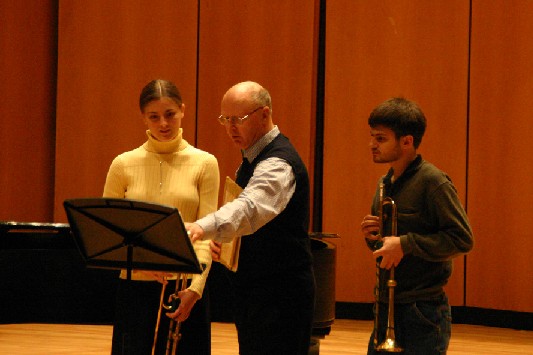
.
BD: Do you find that the students are really getting
better
and better?
CSP: Yes.
BD: Are they getting better and better just technically
or also musically?
CSP: I think both of those things. The the
quality
of teaching is very high now. As a matter of fact, here in
Chicago,
with the two great orchestras in town, it’s slightly unusual.
There
is a long tradition of exceptionally good teaching. But,
generally
speaking, after the last war, so much teaching was done by people that
came out of the army - band masters and bandsmen. Almost
everybody
who does the teaching now is a university graduate. There are
also
many good professional players who do the teaching. The other
thing
that’s changed radically is the quality of the instruments that
students
get to play on.
BD: Is all this teaching of trumpet generally, or is it
of Baroque trumpet?
CSP: I’m talking about trumpet generally. Baroque
trumpet is not taught anything like as much here as it is in Europe or
certainly in England. A rather unusual feature is that at any of
the English colleges - that’s the four colleges in London, Glasgow in
Scotland,
Manchester, Birmingham, Cardiff, and now Leads University - anybody
learning
the trumpet has to do the Baroque trumpet.
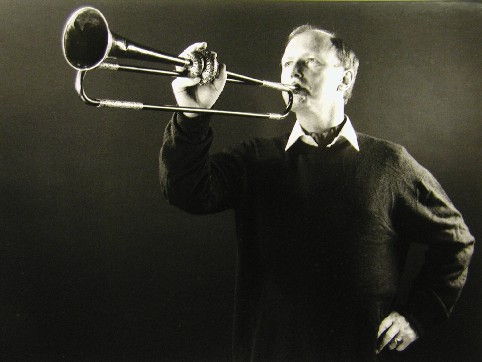
BD: Why?
CSP: It’s to make them aware that there is a variety of
styles, and it’s to give them another string to their bow when they
need
to go out and earn a living. It’s as practical as that. And it’s
actually very good training for the ear and the embouchure. It’s
hard, and I find a lot of students have to reappraise what they’re
doing.
It’s a good time for them to do that in their formative years.
BD: So to learn Baroque music will help them with
Romantic
and Contemporary music too?
CSP: I think it’s good if they have a sense of
perspective.
A lot of our concepts of all musical performance are still very rooted
in the 19th century. I was talking this afternoon about John
Eliot
Gardiner, whom I worked with for 15 years, and I must say I had some
wonderful
musical experiences. It really is a great ensemble and he’s a
good,
even great interpreter especially of choral music of Handel and
Mozart.
I do look back very fondly with memories of that. But standing
away
from it now, I’ve become more of a musical archeologist and a sort of
guinea
pig in trying to assess what it really was like in those times.
Whereas
Gardiner is performing in large halls like the one downtown here in
Chicago,
and Carnegie in New York, that isn’t the acoustic that Bach and Handel
knew. So the conditions are different and he is trying to fulfill
something rather different. As I see it, my role that I've
appointed
myself to is to take a real old instrument off the wall, as an
archeologist
does when he finds an artifact, and allow the artifact to dictate to
him
rather than have professors, conductors or anybody else make those
decisions.
And the way I’ve done that is to actually hire my own orchestras and
put
my money where my mouth is, and actually make the various CDs.
BD: So you’re truly doing the pioneering work.
CSP: I do regard it as pioneering work with varying
degrees
of success. I think it does reveal some quite interesting things
especially about the trumpet, about how gently and softly it was
performed
in the old days. I think that always astonishes people.
BD: Is there still a gap through which we can never
cross,
because while you play the old instruments perhaps even in an accurate
old style, you’re still dealing with new ears?
CSP: That is definitely a problem, or maybe I should
say
it’s a challenge. As you know, I do believe in performing
absolutely
as it was in the period, and, funny enough, I find it’s not the
musicologists
that enjoy it. In fact, most of the conductors like Gardiner,
Trevor
Pinock, even Robert King (whom I still do a lot of playing for) would
much
prefer that I did not play a real historic instrument. They want
the compromise instrument that has vent holes in it, so it conforms to
19th century and 20th century standards.
BD: Are they not trying to get the sound that you want
with the accuracy they want?
CSP: That's correct, yes. It’s a necessary
compromise
and I accept that. It’s just that I’m trying to single-mindedly
push
the frontiers. I really do believe that no one way supercedes any
other. I would never want to invalidate something that somebody
else
is trying to do. I see no harm in playing Baroque music on modern
instruments. But if it’s educated by the experience of thinking
about
how it was done, I think the music is enhanced by that.
BD: So you want to be one of several people doing
several
different styles of the same pieces?
CSP: I’d like to just draw people’s attention to the
fact
that there are different ways of approaching the same thing. As I
say, I don’t think any one or other necessarily is more valid, but
they’re
all interesting, and when you’re talking about Handel, it’s great
music.
It’s there for us to share, and I quite enjoy doing it in two different
ways. I enjoy playing on the modern trumpet and I enjoy playing
it
on the compromise trumpet, but most of all, I like that feeling that I
am just touching fingertips with Handel or Haydn.
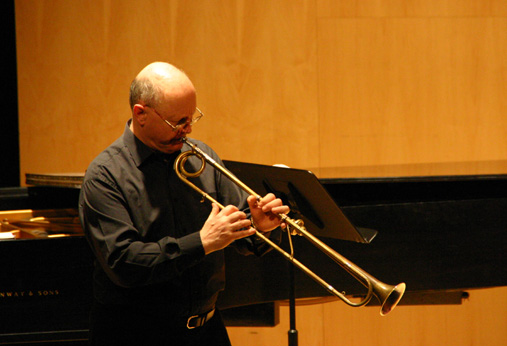
BD: Do you think they are looking down and are happy?
CSP: I hope so. Goodness knows, wouldn’t it be
wonderful
just for half a minute to open a door and hear what it really was like?
BD: Would you really want to?
CSP: I would, I actually would. And I wouldn’t be
fazed in either way. I think the standards were very
variable.
There is no doubt about that. I think if you heard an early Verdi
opera as performed in some of the provincial opera houses you would be
absolutely horrified. The players in the pit orchestra were the
musicians
from the town band, and were mostly virtually illiterate. You’ve
only got to look at what Verdi wrote for them to play. It’s so
simplistic.
They're sort of second trumpet parts. If you’re knowingly playing
on the beat, you’re in the wrong place. (Chuckling) It’s
sort
of "oomp cha, oomp cha, oomp cha" stuff.
BD: Well let me turn this completely on its head for a
moment. You’re the archaeologist of sorts. Are we, perhaps,
getting so that we are eliminating the archaeologists of the future by
leaving recordings of all the brand new works?
CSP: No, I don’t think so. I think we’re opening
a door for people to take it further and further and further. I
long
to hear people doing better than I. There’s a group of young
French
trumpet players who are playing the Bach Cantatas with no finger holes,
and the sad thing is that the orchestral musicians sort of pull a face
and they’re not very impressed by it. I am, and I think a serious
scholar should support them.
BD: Do you feel that playing on these old instruments
is
something of a contest? Do you simply want to get through each
piece
rather than play musically?
CSP: No. I think it’s all about revealing the
music
and the balance in the music. And above all, now we all tend to
specialize
in one instrument. Almost all orchestral musicians of Handel’s
time
had been trained as boy choristers. If they were musical, their
parents
put them into the choir schools and they’d learn to play the keyboard,
they’d learn to compose, they would play a string instrument, and then
maybe a wind or two.
BD: But you at least play a whole trunk full of
trumpets.
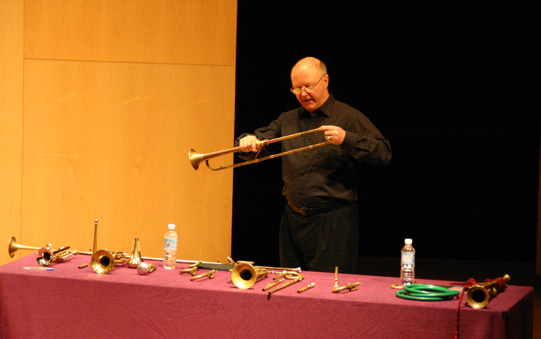
CSP: Yes I do, but I don’t play the keyboard and I wish
I did, because I’m all the time writing for keyboard players. On
this recital I’m playing here, every single item is my own arrangement
and I can’t play the keyboard part.
BD: Do you write any new music or just arrangements?
CSP: By and large it’s just practical things. I
have
written some new music but found it, should we say, derivative.
BD: Would you encourage a composer living today, either
of the conservative school or of the radical school, to write for the
Baroque
trumpet?
CSP: Some people have done it.
BD: Like writing new operas for countertenor?
CSP: Yes, that’s right, yes. Britten did that for
James Bowman in A Midsummer Night's Dream. That is
a
very good example. But don’t forget that that nearly wrecked
James’
career. Singing in a big dry opera house nearly did him in, and
then
he was off singing for a couple of years.
BD: But now we’re doing all the Handel operas in the
big
opera houses with countertenors.
CSP: Yes, yes. Chris Robson is very great chum of
mine. He's quite remarkable. The Xerxes that they
did
here in Chicago with Ann Murray was really one of the great productions
of Handel of all time. But Chris has got quite a big voice and
he’s
developed his technique to do that.
BD: Well we’re kind of dancing around it and hitting it
from several angles. Let me get the easy question straight
on:
What’s the purpose of music?
CSP: To entertain.
BD: That's all???
CSP: If it fails to entertain, I think it fails.
There are other aspects and there are many ways of enjoying
music.
It can be enjoyed at an intellectual level and it can be enjoyed at a
practical
level. But if it fails to communicate, which, I think, was the
problem
with much of the music of the late 20th century, we get bored with
it.
We got bored with hearing it and we got bored with performing it.
It simply failed to communicate with people and it became very hard for
a young composer. Things are a little easier now because people
are
expecting something that’s a bit more intelligible. But you could
argue that it’s like what’s happened with architecture. We’re now
getting these sort of neo-Georgian type houses everywhere around and so
there is no progressive architectural design.
BD: So how does Baroque music fit into this
resurrection
of entertaining and music?
CSP: What I enjoy about it is that, by and large, I
find
much of the music that I do now is in a much more intimate
setting.
When I was in the Royal Philharmonic Orchestra, you’d play a concert,
then
the musicians go out of the stage door at the back, the audiences
shuffle
out at the front and there’s absolutely no point of contact at
all.
When Haydn was in London, for example, people enjoyed meeting him and
he
was a very entertaining man. He was a great bloke to have in the
pub with you, full of stories and a good sense of humor. And
that’s
what I’ve been enjoying in the last ten days touring around the
States.
It’s just the number of people I’ve met. We do a concert and we
find
ourselves leaning with our foot on a bar rail somewhere and discussing
some very serious things, like we are right now.
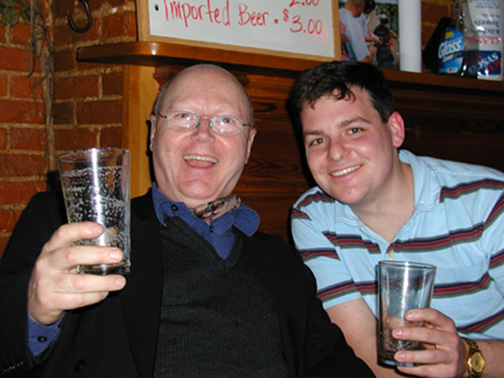
.
BD: Are you discussing music, or is it politics and
aviation?
CSP: Absolutely anything. But a contact point has
been formed and, in my opinion, that was completely lost in the 19th
century.
That era has a lot to answer for in spoiling quite a few aspects of
music.
BD: And yet it left us some good things.
CSP: It left us wonderful things, yeah, don’t get me
wrong
in that. But, I think the intimacy went and the prima donna
appeared
and that is a nuisance. This still lingers with some opera
singers
and conductors. They rather lose the humility of making human
contacts
with people. They like to be regarded as something special and
elated,
and I personally think that those days have gone.
BD: You don’t think you’re special?
CSP: I am to my grandchildren and, I hope, to the
friends
I meet. It’s more important to me to have great friends. I
just blow the trumpet as opposed to going to an office.
BD: Is the music that you play special?
CSP: Well, it’s special to me and I like to share it
with
people that enjoy it, hopefully in the way that I do. I suspect
that
there are some people that think, "Why does he bother? So
what?"
I am more consious of that in America where it’s a younger culture and
a forward looking culture. Europe is a very backward-looking
culture
especially, I’m afraid, in England. We do tend to look back on
our
history, and it remains to be seen how this will all work itself out as
the European nations try to amalgamate themselves. Of course,
that
could all completely unravel, like the Balkans have.
BD: But there again, we’re getting into politics.
CSP: We’re getting into politics, but these things do
interlink.
I think if we had Mozart sitting with us now, we’d find that his
conversation
would probably veer to rather more course things than that. I
mentioned
about having Haydn as a great bloke to be in the pub with. I tend
to look at composers and think, "Who would I like to take down to my
local?"
Someone like Beethoven would be rather embarrassed and bit bored, but
Haydn
and Mozart and Handel, I think, would be very entertaining
company.
Also Purcell, maybe.
BD: Of course, the din wouldn’t bother Beethoven later
in his life.
CSP: No, that’s right. You might have to shout
rather
loudly at him!
* *
*
* *
BD: A little about playing trumpet, now. Does
your
technique change for the size of the house or do you rely only on the
instruments?
CSP: The conditions that one encounters on a tour like
this vary every day. You sort of have to use the acoustic, and a
dry acoustic is very difficult. What one tends to do is to have a
music stand, even if you’re not using it. A solid music stand
gives
you some kickback from the sound. It’s something that I even tell
young singers to do.
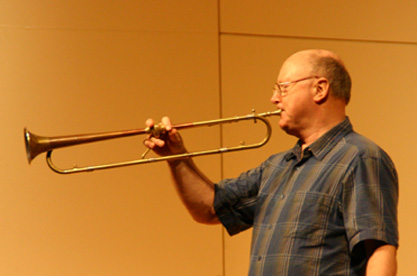 BD:
You can’t rely on the sound from the back wall?
BD:
You can’t rely on the sound from the back wall?
CSP: That’s right. If it’s a very dry acoustic,
the
sound just dies and a performer gets very disheartened. That’s
where,
if I’m working with a singer who is finding that, I say hold the book
so
that you can just reflect some of the sound back to yourself. So
I also do that.
BD: But don’t put it in front of your face!
CSP: Not in front of your face, but put it somewhere
where
it will just reflect a little bit back to you so that you don’t feel
completely
isolated. That’s a horrible feeling. You sort of get dry
mouth.
BD: You don’t want to be like a rock musician, and have
a speaker blaring back at you, do you?
CSP: No. No, thank you. A friend of mine
formed
a group where they were playing Mozart through speakers. They
thought
this is what the masses would want.
BD: Oh, gawd!
CSP: Of course, the wonderful thing about that music is
it’s restful, and that is the essence of why we do period music
performance
- to reassess the internal balance of the orchestra. I remember
Hogwood’s
recordings of the Mozart symphonies literally using two first violins,
two second violins. There the second bassoon part becomes much
more
important. If you hear that music with the Chicago Symphony, you
can hardly hear the second bassoon. It may as well go home.
So that sort of thing is very interesting. I actually do quite
enjoy
music at a very much lower dynamic level. We’ve got used to a lot
of high frequency and a high volume of sound. I find going to an
ordinary public cinema now an excruciatingly painful experience.
I just cannot do it. Or if I really must, I have to fill my ears
with paper or something because it’s absolutely painful. And you
ask them to turn it down, they won’t have it.
BD: They’ll say, “Whaaaaaaat????”
CSP: Yes, exactly, exactly!
BD: Well, here again we have to bridge this gap to the
new ears which have been inundated with all of this.
CSP: They’re desensitized. We’re desensitizing
our
bodies and everything now, aren’t we, with the food bang full of
chemicals.
BD: So are we, people like you and me, becoming
dinosaurs?
CSP: I don’t know, but I don’t think it hurts to make
people
aware of things. That’s why I like to make people aware of my own
thoughts about the way I approach my own particular subject. I
think
it relates to all sorts of other things. We’re taking about
quality.
Quality of life and quality of friendships and all that. All
these
things constantly need to be reassessed.
BD: Well, are you optimistic about the whole bag?
CSP: Yes. You have to be. Mercifully, we retain
our
sense of humor and, you know, laughter is the best medicine.
* *
*
* *
BD: Is the music that you play for everyone?
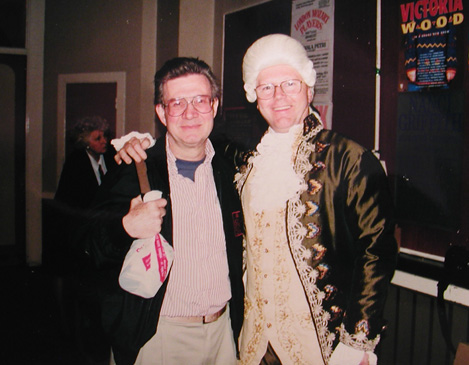 CSP:
I’m rather lucky in a way, because I work for an impresario in England
called Raymond Gubbay who believes very much that music is for ordinary
people to share. So for two months of the year in the fall, I
travel
around the United Kingdom with a group in costume, wigs and
tights.
Can you believe it?
CSP:
I’m rather lucky in a way, because I work for an impresario in England
called Raymond Gubbay who believes very much that music is for ordinary
people to share. So for two months of the year in the fall, I
travel
around the United Kingdom with a group in costume, wigs and
tights.
Can you believe it?
BD: Baroque music, in Baroque costumes on old
instruments?
CSP: No, we use modern instruments. It’s madness,
but it means that people come and it’s often their first experience of
classical music live. We take the music very seriously and they
get
very high quality performances. The music is aimed at being
tuneful,
not too heavy. I think the reason that Raymond uses me is because
I walk on the stage and smile and try to include an audience.
BD: You are very personable on stage.
CSP: Well, I learned that from the countertenor James
Bowman.
It makes an audience relax, and if they’re relaxed then you relax, and
then you can get on with creating things. I think a tremendous
problem
that one encounters now is that a lot of music making at college level
gets away from becoming a creative experience. It’s just
reproducing,
very often trying to imitate other performances that they hear on
record.
I think the creativity is essential even if you’re doing it backwards
like
me.
BD: Even though you are making the records that people
try to imitate?
CSP: Yes, I’m trying to communicate. What I do
for
Raymond Gubbay liberates me from having to be in a symphony orchestra
the
rest of the year because those two months pay my bills for a
year.
So then I can get on with the serious research work which he respects
but
he doesn’t want to use. That’s fine by me. I’m quite
comfortable
with it.
BD: He hasn’t offered you a 12 month contract?
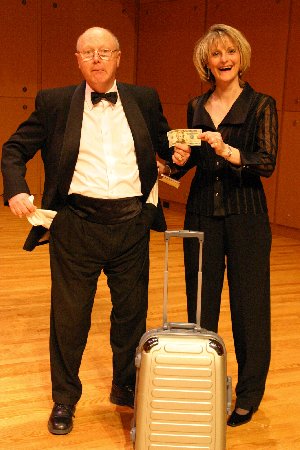 CSP:
It’s just a seasonal thing leading up to Christmas. But I quite
like
being self employed. I quite like the independence. It
means
I don’t have the scrapes with authority that by nature would otherwise
lead me into…
CSP:
It’s just a seasonal thing leading up to Christmas. But I quite
like
being self employed. I quite like the independence. It
means
I don’t have the scrapes with authority that by nature would otherwise
lead me into…
BD: Well, how would your life change if you hit the
national
lottery?
CSP: Hmmmm, that’s a hard one. I don’t want
sudden
money. I really wouldn’t like to be in that position. Even
though music is hard in England now, I’m quite happy. We have a
thoroughly
Philistine administration that does not support serious arts. To
our great disappointment, they regard us as being elitist. Under
the Harold Wilson administration, the minister of arts was Jennie Lee,
who was Nye Bevan’s widow. I remember a very close friend of
mine,
a young trumpet player, was killed in a car accident. He came
from
a mining village in Kent, and I went to play at his memorial service
and
she, the minister of the arts, turned up. I don’t see the present
minister doing that kind of thing.
BD: Wasn’t it Heath who was actually an amateur
conductor?
CSP: Yes, appalling conductor I’m afraid…
BD: …but an obvious enthusiast.
CSP: Yes. Now having said that in a rather
disparaging
way, he did so much good because he raised the perspective of music and
it became a trendy, fashionable thing to enjoy. Unfortunately,
with
Princess Diana no longer alive, because she was a great supporter of
the
arts, there is nobody like that around. We do follow fashion in
England.
We pretend we don’t, but we do very much. And sadly, without a
public
figure that sort of sponsors us emotionally, as it were, the arts are
in
quite a bit of difficulty in England.
BD: But you’re not going to get the next leader of one
political party or another running on the “Arts Platform.”
CSP: No, certainly not. But maybe we have done
too
much of the backward-looking arts with music. One of the
difficult
things I think we were talking about, was the problem of composers not
being able to communicate, and that’s a great sadness because it means
that the orchestra has sort of stumbled and it hasn’t been able to move
on. Only in film music has the symphony orchestra gained its
foothold
in modern culture, which is I think regrettable.
BD: Is there any hope at all?
CSP: I think there is always hope because the pendulum
swings. That's the one great truth in life, I think. In
other
words, when things are going rough, and when the economy is bobbing
down,
history tells us that it comes back. And the other thing is to
remind
ourselves that when all is going well, watch out! It will swing
back.
So try and keep a level keel. Keep the decanter circulating as
they
say.
* *
*
* *
BD: We were talking a little bit before about the
different
halls. You have to play and keep practicing different
trumpets.
Do you also have to learn to play halls, or is that just residual off
of
each instrument?
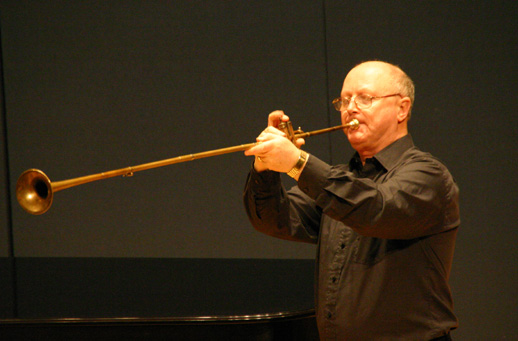
CSP: To a certain extent. During the seventies
and
eighties we started getting these ghastly halls that were designed by
people
who were too clever by half, and the acoustic was poor. One of
the
problems is the acoustic is designed for the listener, not for the
performer.
I find a lot of halls where the audience can hear every detail of
what’s
going on in an orchestra, but the players can’t necessarily hear what’s
happening a few feet away.
BD: But aren’t we listeners supposed to be the ones
that
get the best of it?
CSP: Well, one would hope so. But I mean the
worst
offender for that was the symphony hall in Birmingham when it was first
opened. They have improved the acoustic there, but I remember we
performed with Hogwood the B minor Mass, in those choral
numbers
and where the trumpet is playing with the soprano, I just could not
hear
them at all.
BD: Did you just close your eyes and hope for the best.
CSP: Yeah.
BD: Is there ever a night that you get it all just
right?
CSP: It does, but it never can be good enough.
BD: Though you continue to strive for it?
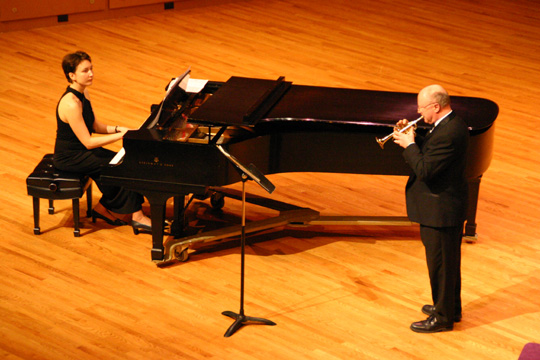
CSP: You do strive for it and that moment happens when
you least expect it sometimes. It catches up with you. You know
when
it clicks, and very often that moment is made as much by the audience
as
by the performers. That’s the drug that musicians go for.
They
crave that experience. You know when it happens. It doesn’t
happen very often, and it really is like a drug.
BD: So then are we, the public, just eavesdropping on
your
event?
CSP: No I think you’re sharing it. I hope you're
sharing it because we need the public. Without the public support
and money, nothing happens. We don’t function. I think it’s
absolutely vital to involve the public. That’s why I like the
intimacy
where you actually get to meet people and talk, which is why I sell
CDs.
It’s not entirely a mercenary thing. It is actually a forum, a
point
of contact.
BD: You get to look someone in the eye.
CSP: Yeah, and you sign a CD for them. What I
find
with the concerts I do for Raymond going around the country year after
year, people say, “Oh, what’s the new CD?” Eventually you can
actually
form, sometimes, quite close personal relationships. There are
about
four families last year that I went to play for their daughters'
weddings.
I just went as a guest, and that’s lovely you know, ‘cause I’d become
friendly
from just meeting them year after year, and I think that’s wonderful,
you
know. I’m greatly honored to be asked. That’s what’s it all
about.
BD: You do it because they get it.
CSP: They get it, they get it.
BD: Are enough of us getting it?
CSP: Well I hope so, I hope so. We do tend to get
a bit boxed in nowadays and it all moves so fast that we tend to not
see
the wood for the trees. We’re all like that. Look at me
dashing
around. This trip, for instance, involves 10 days, and 3000 miles
driving. It’s crazy. I got to my hotel room last night at
3:15
am not ‘cause I spent the entire evening in the pub, but simply trying
to get from one place to another.
BD: In the end, is it all worth it?
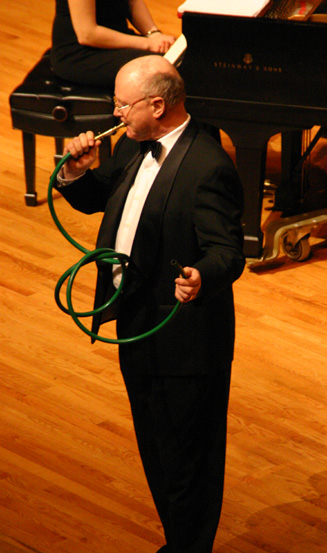 CSP:
Yes, I think so. Well I always say about earning a living in
music,
it’s better than working. We’re very lucky. We’re paid to
do,
hopefully, what we love. I’m in the evening of my career now and
still thoroughly enjoying it, and what I enjoy very much is that I’m
mixing
all the time with young people. It’s a wonderful way of
conducting
one’s life because it happens without regards to class, social status,
age, or nationality or race or any of that. None of that
matters.
There’s just something that we all share which is the language of
music,
and hopefully we can communicate it to one another. And I really
do believe that includes the audience. They’re part of it.
CSP:
Yes, I think so. Well I always say about earning a living in
music,
it’s better than working. We’re very lucky. We’re paid to
do,
hopefully, what we love. I’m in the evening of my career now and
still thoroughly enjoying it, and what I enjoy very much is that I’m
mixing
all the time with young people. It’s a wonderful way of
conducting
one’s life because it happens without regards to class, social status,
age, or nationality or race or any of that. None of that
matters.
There’s just something that we all share which is the language of
music,
and hopefully we can communicate it to one another. And I really
do believe that includes the audience. They’re part of it.
BD: So this is the advice you have for audiences, just
to keep exploring?
CSP: Keep supporting. And yes, I like the idea of
it being a little bit more social. Don’t be afraid. If
you’ve
enjoyed what somebody’s done, don’t be nervous. Just go up and
tell
’em you’ve enjoyed it. The 19th century diva or maestro would
tend
to just turn their nose up and march off. I hope things are
changing.
BD: What advice do you have for conductors who want to
program Baroque music?
CSP: Learn to play an instrument. Sit at the back
of the orchestra and then you’ll see what you need to do.
They
don’t know what’s required to play together. A guy up there in a
tail suit wagging his arms about not making a sound is the one
unauthentic
thing.
BD: Wasn’t Christopher Hogwood originally a
harpsichordist?
CSP: Hogwood was a very, very good keyboard player, but
I think they need to sit and play a wind or a string instrument to know
what it is to be at the receiving end of a clear downbeat.
Flailing
their arms around like a windmill is very off-putting. And that
goes
for 19th century music as well. The conductor does have a very
necessary
function and that’s to keep the thing tight.
BD: Of course, in the Baroque period, the leader of the
group was usually the guy who wrote the piece.
CSP: Yeah, exactly. He knew how it went and he
would
start it off and then he’d hold it together by playing the continuo.
BD: And he would learn from what he heard?
CSP: One hopes, yes. I think he would. And
the other thing is that he wrote very specifically for individual
singers
and instrumentalists, and for their strengths. Bach didn’t write
those difficult trumpet parts just to hear them assassinated week after
week. That Gottfried Reiche was one hell of a good player.
What would I give to just hear that. I shall have to wait till I
go through the pearly gates.
BD: You were born in December of 1944. Are you at
the point in your career you want to be now at the beginning of this
new
millennium?
CSP: I’ve been very lucky and have had a tremendous
variety
of experience. I’ve played in dance bands, symphony orchestras,
opera,
chamber orchestras, Baroque orchestras, and now I’m a soloist and
enjoying
it and able to handle it. I've no illusions about were I should
be
and shouldn’t be. I enjoyed doing a lot of commercial music at
one
time for the films and television. The variety of it’s been
wonderful
and the many friendships have been wonderful, too, and they’re very
long
lasting.
BD: One last question. What general advice do you
have for young trumpet players?
CSP: I think above all it would be to enjoy what you’re
doing. It’s very important to enjoy it. Don’t get too
bogged
down with it. I think it’s very important that you should be
creative
about it and if you feel joy in what you do, you will communicate
joy.
If you don’t, you won’t. I think there’s a fair amount of truth
in
that.
BD: Thank you for all of the performing and recording
that
you’ve given us so far.
CSP: Well, thank you, Bruce. Let’s hope I do some
more.
- - - - -
= = = = =
- - - - -
Currently a Music Lecturer in the School of Continuing Studies of Northwestern
University, BRUCE DUFFIE spent just over 25 years with WNIB,
Classical 97 in Chicago. His series of programs and
interviews
won for him the ASCAP/Deems Taylor Broadcast Award in 1991, and
he continues to be heard weekly on WNUR-FM, and twice each
month
on Contemporary Classical Internet Radio. Throughout his
career,
his interviews have been published in various magazines and journals,
and
some now also appear elsewhere on this website. To
see a full list (with links) of interviews which have been
transcribed and posted on this website, click here.
You are invited to visit his
Website and to send him E-Mail
.
©2001 Bruce Duffie
My thanks to Sharon Jacobson Stine for her help in preparing this
interview
for presentation, and for the photos of the artist.
 Trumpeter
extrodinaire on both old and new instruments, Crispian Steele-Perkins
has
built a foremost reputation around the world for his artistry and
intelligence.
Bringing music that is both historically accurate as well as generally
entertaining is his goal, and he manages to succeed very well no matter
what the venue or the situation.
Trumpeter
extrodinaire on both old and new instruments, Crispian Steele-Perkins
has
built a foremost reputation around the world for his artistry and
intelligence.
Bringing music that is both historically accurate as well as generally
entertaining is his goal, and he manages to succeed very well no matter
what the venue or the situation.





 BD:
You can’t rely on the sound from the back wall?
BD:
You can’t rely on the sound from the back wall?
 CSP:
I’m rather lucky in a way, because I work for an impresario in England
called Raymond Gubbay who believes very much that music is for ordinary
people to share. So for two months of the year in the fall, I
travel
around the United Kingdom with a group in costume, wigs and
tights.
Can you believe it?
CSP:
I’m rather lucky in a way, because I work for an impresario in England
called Raymond Gubbay who believes very much that music is for ordinary
people to share. So for two months of the year in the fall, I
travel
around the United Kingdom with a group in costume, wigs and
tights.
Can you believe it?
 CSP:
It’s just a seasonal thing leading up to Christmas. But I quite
like
being self employed. I quite like the independence. It
means
I don’t have the scrapes with authority that by nature would otherwise
lead me into…
CSP:
It’s just a seasonal thing leading up to Christmas. But I quite
like
being self employed. I quite like the independence. It
means
I don’t have the scrapes with authority that by nature would otherwise
lead me into…


 CSP:
Yes, I think so. Well I always say about earning a living in
music,
it’s better than working. We’re very lucky. We’re paid to
do,
hopefully, what we love. I’m in the evening of my career now and
still thoroughly enjoying it, and what I enjoy very much is that I’m
mixing
all the time with young people. It’s a wonderful way of
conducting
one’s life because it happens without regards to class, social status,
age, or nationality or race or any of that. None of that
matters.
There’s just something that we all share which is the language of
music,
and hopefully we can communicate it to one another. And I really
do believe that includes the audience. They’re part of it.
CSP:
Yes, I think so. Well I always say about earning a living in
music,
it’s better than working. We’re very lucky. We’re paid to
do,
hopefully, what we love. I’m in the evening of my career now and
still thoroughly enjoying it, and what I enjoy very much is that I’m
mixing
all the time with young people. It’s a wonderful way of
conducting
one’s life because it happens without regards to class, social status,
age, or nationality or race or any of that. None of that
matters.
There’s just something that we all share which is the language of
music,
and hopefully we can communicate it to one another. And I really
do believe that includes the audience. They’re part of it.